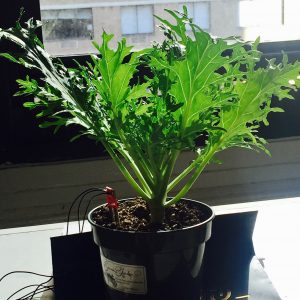Jasmine A Soltani, Swapna Joshi
Making visible the invisible ecosystem services provided by plants by giving people the option to pay money to a responsive plant and showing how humankind benefits in a multitude of ways from natural ecosystems.<br />
http://www.itp.jasminesoltani.com/
Description
A coin-operated responsive plant that rotates to acknowledge human presence and a visualization of the CO2 content, soil moisture and noise in its environment.
The inputs we're reading for the plants movement are proximity to the plant (measured using distance sensors) and the switch triggered with a coin drop. The sensor data we're gathering will be part of the associated visualization, which right now only includes real-time data. Based on feedback from play-testing, we plan on incorporating a slider, which would compress or expand the time scale. Then the coin drop could trigger other feedback, like an explanation of where the quarter is going.
Our project is meant, in part, to prompt people to think about the work that plants do regulating our environment and making it habitable, and what it means to put monetary value on these services in a capitalist society where humans have trouble understanding value that isn't purely economic. Trees and plants provide important carbon sequestration benefits, which we hope to highlight with the CO2 data we collect. It is also an exchange with a non-human, generally immobile, but living being, that involves you communicating with it via your breath and physical presence while it communicates through photosynthesis and the representation of data. We want to bring forth the way you are each affecting the surrounding environment and sensing each others presence in difference ways. We plan to donate the money (quarter dollar paid by each person to interact with the plant) to 350.org which is a global grassroots climate movement that can hold our leaders accountable to the realities of science and the principles of justice. The number 350 means climate safety: the planet has already surpassed 'safe' upper limit of 350ppm atmospheric CO2 and people, governments, and the world are already starting to feel the consequences.
Classes
Introduction to Physical Computing ITPG-GT.2301.005, Introduction to Computational Media ITPG-GT.2233.003

